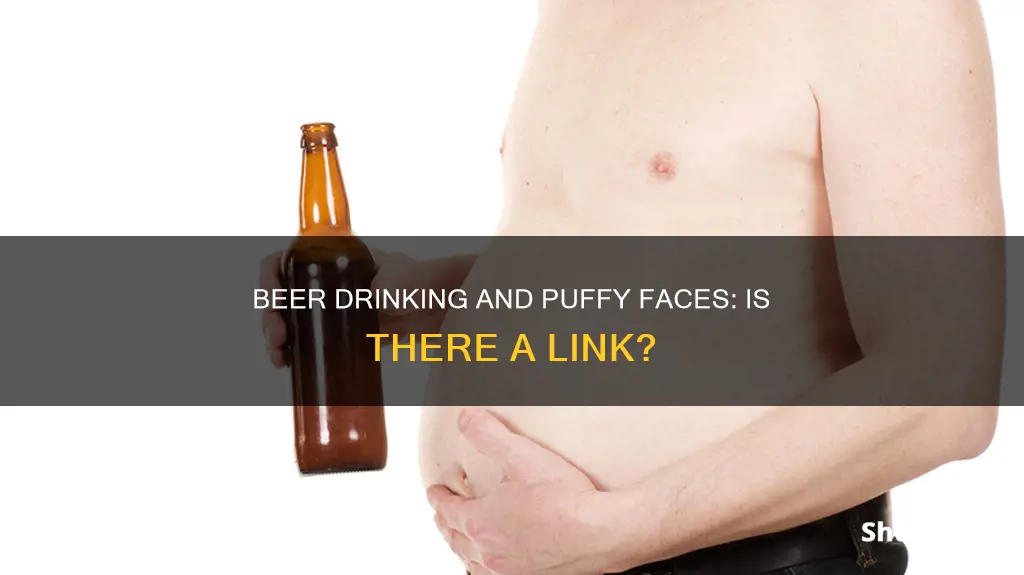
Alcohol is a diuretic, which means it makes you urinate more frequently, leading to dehydration. When the body senses dehydration, it stores extra water, causing facial tissues to swell and resulting in a puffy appearance. Alcohol also causes inflammation throughout the body, including the skin, which can manifest as redness, puffiness, and enlarged pores. Additionally, alcohol is often combined with mixers containing sugar, leading to weight gain and further contributing to a puffy face. The effects of alcohol on the face include puffiness, bloating, spider veins, premature ageing, and a duller complexion.
| Characteristics | Values |
|---|---|
| Skin Appearance | Redness, puffiness, increased acne and wrinkles, premature aging, duller complexion |
| Reasons | Alcohol triggers inflammation, weight gain, dehydration, blood vessel enlargement |
| Treatment | Drink water, avoid carbonated beverages and beer, eat and drink slowly, get regular exercise, limit salty foods |
What You'll Learn
- Alcohol causes dehydration, leading to puffy skin
- Alcohol triggers inflammation throughout the body, including the skin
- Alcohol consumption can cause weight gain, contributing to facial puffiness
- Alcoholic drinks mixed with sugar and carbonated liquids can worsen puffiness
- Alcohol can cause or worsen skin conditions like rosacea, leading to facial redness and puffiness

Alcohol causes dehydration, leading to puffy skin
Alcohol is a diuretic, which means it makes you urinate more frequently. This leads to dehydration, causing the skin to lose fluid and nutrients vital for a healthy appearance. When dehydrated, the body stores extra water, resulting in facial tissues swelling and a puffy appearance. This is known as edema.
Drinking alcohol can cause redness, puffiness, increased acne, and wrinkles, as well as premature ageing and a duller complexion. Alcohol triggers inflammation throughout the body, including the skin, and can cause blood vessels to dilate or break, giving the face a redder appearance.
To combat alcohol-induced puffiness, it is recommended to drink water before, during, and after consuming alcohol. This helps to prevent dehydration and reduce bloating in the face and stomach. It is also suggested to avoid carbonated beverages and beer, as the carbon dioxide gas they release can increase bloating.
In addition to immediate remedies, such as cold compresses and elevating your head while sleeping, long-term solutions may be necessary if puffiness becomes a recurrent issue. These can include cosmetic treatments such as laser treatments and dermal fillers, as well as lifestyle changes like limiting alcohol intake and maintaining a skincare routine that includes moisturising.
Beer and Cannabis: Safe Consumption Explored
You may want to see also

Alcohol triggers inflammation throughout the body, including the skin
Alcohol is an inflammatory substance, and its consumption can cause swelling in the body. This inflammation is often worsened by mixers that contain sugar and carbonation, leading to further gas, discomfort, and bloating. Alcohol's diuretic effect also causes the loss of vital fluids and nutrients, such as vitamin A, which is essential for skin health. This can make the skin look wrinkled, dull, and grey.
The inflammatory effects of alcohol on the skin can be combated by drinking plenty of water before, during, and after consuming alcohol. This helps to reduce bloating and rehydrate the body. It is also recommended to avoid carbonated beverages and beer, as the carbon dioxide gas they release can increase bloating.
In addition to causing puffiness and redness, alcohol can also worsen skin conditions such as rosacea and eczema. Rosacea is characterised by redness, dilated blood vessels, and pus-filled spots on the face. Alcohol can trigger flare-ups of this condition, and long-term heavy drinking can cause premature ageing and a dull complexion.
The effects of alcohol on the skin are not limited to puffiness and redness. Alcohol can also lead to weight gain, as it is calorie-dense and often combined with sugary mixers. This can result in the formation of a "beer belly," which refers to the stubborn fat that accumulates around the middle of frequent drinkers.
Understanding Beer Distribution: From Brewery to Glass
You may want to see also

Alcohol consumption can cause weight gain, contributing to facial puffiness
Alcohol consumption can negatively impact your health in several ways, including weight gain, which can contribute to facial puffiness. Alcohol is calorie-dense, with around seven calories per gram, almost as many as pure fat. These are empty calories, devoid of any nutritional value. Alcoholic drinks often contain additional calories from carbohydrates, such as sugar or starch, further increasing their calorie count. For instance, a large glass of wine can contain the same number of calories as an ice cream sundae.
Research indicates that the calories consumed through alcohol are often additional to those from other food sources, leading to unintended weight gain over time. When you consume alcohol, your body prioritises removing it as a toxin, interrupting essential tasks like nutrient absorption and fat burning. This interruption of normal metabolic processes can also contribute to weight gain.
Alcohol can also cause water retention and dehydration, leading to a puffy face. When dehydrated, the body tries to retain water, resulting in facial tissues swelling and a puffy appearance. This dehydration also causes the skin to lose fluids and nutrients vital for a healthy appearance, making it look wrinkled, dull, and grey.
Additionally, alcohol triggers inflammation throughout the body, including the skin, leading to redness, puffiness, and enlarged pores. This inflammatory response can be exacerbated by commonly mixed sugary and carbonated beverages, resulting in further gas, discomfort, and bloating.
To summarise, alcohol consumption can lead to weight gain through its high calorie content and disruption of normal metabolic processes. It can also cause water retention and dehydration, resulting in facial puffiness. The inflammatory effects of alcohol and the loss of fluids and nutrients can further contribute to a puffy and less healthy-looking face.
Digging Dogs and Beer: A Dangerous Mix?
You may want to see also

Alcoholic drinks mixed with sugar and carbonated liquids can worsen puffiness
Alcohol also causes inflammation throughout the body, including the skin, leading to redness, puffiness, and enlarged pores. This inflammatory effect is worsened by mixers that contain sugar and carbonation, resulting in more gas, discomfort, and bloating. Carbonated beverages and beer can further aggravate bloating, so it is advisable to avoid these drinks if puffiness is a concern.
The combination of alcohol and sugar can also lead to weight gain. Alcohol is calorie-dense, and when mixed with sugary substances, the calorie count increases significantly. This can contribute to overall weight gain and facial bloating.
Additionally, alcohol interferes with essential tasks like absorbing nutrients and burning fat. It disrupts these processes until it has been processed by the body, leading to potential weight gain and a puffy appearance.
To mitigate the effects of puffiness caused by alcoholic drinks mixed with sugar and carbonation, it is recommended to stay hydrated by drinking plenty of water before, during, and after consuming alcohol. This helps to combat bloating and reduce the inflammatory response.
How to Drink Beer: The Head Conundrum
You may want to see also

Alcohol can cause or worsen skin conditions like rosacea, leading to facial redness and puffiness
Alcohol can have adverse effects on your skin, including causing or exacerbating skin conditions such as rosacea, which can lead to facial redness and puffiness. Rosacea is a chronic skin condition characterised by redness and small, red bumps on the face. Alcohol consumption can trigger flare-ups of this condition, leading to increased redness and puffiness in the facial area.
A study published in the Journal of the American Academy of Dermatology found that alcohol consumption increases the risk of developing rosacea, particularly in women. If you already have rosacea, drinking alcohol can frequently trigger these flare-ups, resulting in a red and puffy appearance.
Alcohol is a diuretic, which means it increases urine production and leads to dehydration. When the body becomes dehydrated, it tries to retain water, causing facial tissues to swell and giving the face a puffy appearance. This dehydration also causes the skin to lose fluids and nutrients vital for a healthy complexion, making the skin appear dull, wrinkled, and grey.
Additionally, alcohol causes inflammation throughout the body, including the skin. This inflammation can manifest as redness, puffiness, and enlarged pores on the face. Alcohol can also cause broken blood vessels, which can further contribute to facial redness.
To mitigate the effects of alcohol on the skin, it is recommended to limit alcohol intake and stay hydrated by drinking plenty of water. A balanced skincare routine that includes moisturising can also help reduce the negative impact of alcohol on the skin.
Beer and Anxiety: A Surprising Relationship
You may want to see also
Frequently asked questions
Yes, drinking beer can make your face puffy due to dehydration and inflammation caused by alcohol.
Alcohol is a diuretic, which leads to dehydration and subsequent water retention in the face, resulting in a puffy appearance. Additionally, alcohol causes inflammation throughout the body, including the skin, leading to redness and puffiness.
Yes, the consumption of sugary and carbonated mixers along with beer can worsen bloating and puffiness in the face.
The onset of facial puffiness can vary depending on individual factors such as metabolism, but it is often noticed the morning after a night of drinking.
There are several ways to reduce facial puffiness:
- Drink plenty of water before, during, and after drinking beer.
- Stay away from carbonated drinks and other carbonated mixers.
- Eat and drink slowly to reduce the amount of air swallowed.
- Try cold compresses, such as cold water splashes, cold spoons, or ice cubes wrapped in a cloth.







